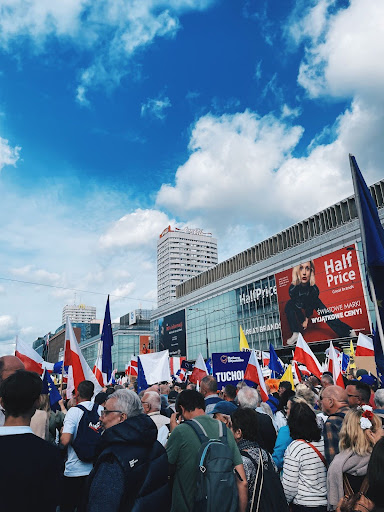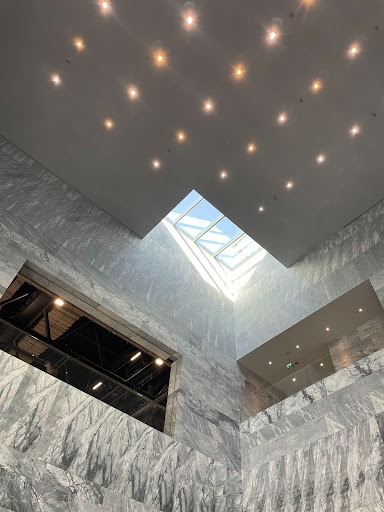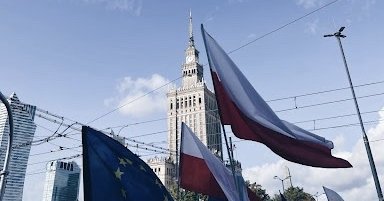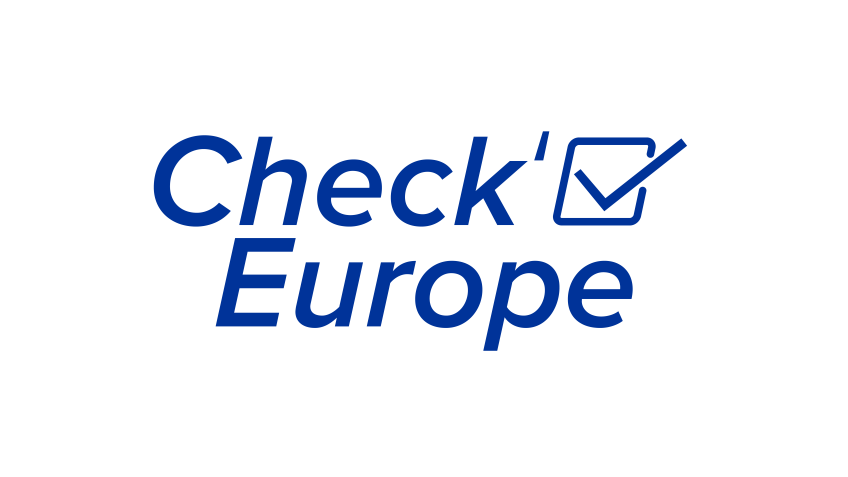I was sitting in the metro in between interviews in Warsaw and as I sat down I looked to my right and noticed a person was scrolling through their phone reading the news on Polish elections. I kept seeing either the face of candidates of the opposition or the ruling party. Since I had landed in Warsaw some days ago, I had felt this silent and underlying nervousness in the air. Everyone knew these elections were important as the country had been facing inflation, tensions in the borders, the always looming war in Ukraine and pressure between opposition and the ruling party reflected in the media landscape.
I could only feel giddily hopeful as some days before I had joined the 1 million heart march in Warsaw with a friend and saw many people across generations join and so many issues being displayed and embraced there: from fighting climate change to abortion rights (strajk kobiet). There were small stools all over the city centre where you could buy EU flags, pins and stickers with a white and red heart. As one of the voters I interviewed shared with me, right now was the opportunity the opposition had been waiting for eight years to end the nightmare that PiS had been. In the streets of Warsaw you could feel it, as white and red hearts filled up the backpacks and coats of many streetwalkers, you could see the faces of many candidates from the opposition from balconies and smiling posters of the Mayor of Warsaw in buses. I could describe Warsaw those days with the feeling of this sweet expectation one feels when they know something good could happen.
This air of hope and joyful expectation did not invalidate the serious concerns many I spoke to shared.
The role of the media has been an undeniable one during these elections and in the last years in Poland. People described their effort to read and listen to as many media sources to keep informed, but always with a ‘pinch of salt’. One of the people went as far to say how the news had become brutal and intense as the campaign unfolded and it was hard to find clear and objective news on the political situation in the country. Indeed, most of those I spoke to craved objectivity which they found hard to get with the current options in the country, showing their preference for online sources in comparison to television, considering this media outlet very much influenced by the government in power. One of the people explained that depending on what you read you will encounter two different Polands.
While people I interviewed engaged in the elections differently, from distributing flyers, to joining marches or just keeping themselves informed. It was noticeable that a certain level of attention was given to them and all intended to vote, regardless of the problems they said the campaign was having. Many called attention how a better future was on the ballot and that these elections were crucial. From advancing human rights to investing properly in defence, as the fear of conflict and instability kept luring over Poland. They also shared how migration and the threat or opportunity it could be for the country was a key election topic stretched between extremes. I remember thinking that in all these conversations I noticed how tired people were of how every single issue that mattered for the future of their home were in some ways up in flames, kicked around in an unfiltered political discourse that seemed to them that did not really care about their interests.

One conversation that struck me was a person describing that while they followed politics, the values associated with their religious belief: believing in the goodness in people, kindness, mattered and they were the guide for the way they engaged with the world, from community service to being there for others. This anchor in one’s values and priorities was not uncommon to come when you spoke to voters: what mattered was not ideologies, but what they deeply believed was right. This served as an important reminder that critical thinking and a moral compass must be there when engaging with politics simply in an environment described by most as tiresome and inflammatory.
A big part in what contributed towards this environment in Poland was the division within the country, simply between urban and rural areas. This was ever more striking during the intense campaign period. People in cities marched for democracy and human rights as their main flags and were where the opposition invested most of its resources. One of my friends pointed out that people who support PiS, coming from a small town or village, were not necessarily against human rights and cheering for the erosion of democracy, as some supporting the opposition believed, instead they simply had more pressing priorities: they cared about which government would promise the greatest social benefits for them and their children, because that mattered between facing economic and social struggles or not. A shared sentiment was that a future Polish government needs to close the gap between this division and be able to speak to everyone, since the way the parties have been operating has contributed to seed division and polarisation in the country.
Media outlets have also had a significant role in this polarisation, as many have been used to shape certain narratives connected to migration, human rights and Ukraine. All those I talked to, described media bubbles in which only certain narratives have space, sharing that they do not really have in the media space somewhere where different ideas and opposite views can be confronted on the same topic, leaving this vacuum between completely opposite views. You could notice there is a certain difficulty in Poland in really coming to definitive answers and perspectives on, for instance, migration, precisely due to the conflicting and inflammatory information in the topic in media cycles.
A Ukrainian friend who had lived in the country for years, described how they felt their country’s future was being used as a political pawn during elections and how they felt hate became part of the narrative associated with their country, that Ukraine owed something to Poland. Their own family called and asked how the election would go, they knew whoever would come victorious would have a big impact on the support of the fight of Ukrainians. There are many reasons for this, both because Poland and its people came at the immediate aid of Ukrainians as the full scale invasion unfolded and even the fact that Poland became a key in the supplying of weapons to Ukraine. And so, Ukrainians patiently watched voters go to the ballots knowing that their choice would impact the future of their homeland.
Another event caught up in a whirlwind media news cycle was the opening of the Polish History Museum. While I was in Warsaw some of my friends joked about how conveniently the museum had just opened. Most of them considered it a campaign stunt by the ruling party to win favour of voters.
With one zloty (around 20 cents) I was able to check the temporary exhibition in the recently opened museum. It is definitely worth the visit. The building is nothing but impressive, big, strong and full of light. I thought for one second when I was inside that if a piece of architecture could encapsulate how I had experienced the spirit of the Polish people I had encountered during my years living in the country, it would be very much that one. As I had lived through a pandemic and many turbulent times in my life, the Polish’s determination, courage and resoluteness were the solid building that surrounded me during that time. The building of my imagination could be very much matched with that one.

The exhibition displayed a series of objects that marked certain events and periods in Polish history. The collection of the museum was described as never-ending very much the same way as the history of a country is constantly being written. In those days, as the time to go to the ballot approached, history of Poland was again having ink into paper.
History indeed unfolded with the same enthusiastic hope of the future that you could feel in the streets of Warsaw some days before, reflected in the words of Tusk in his speech on the night of October 15th. Tusk described himself as the happiest man on earth and that democracy had won. According to the National Electoral Commission (PKW), while PiS came out with the highest number of votes at 35.38% it did not amount to a majority which cannot also be formed with Confederation, the extreme far-right party which had been described some weeks before as the potential kingmaker of the elections. As one of the people interviewed shared scepticism about their potential to lead the country, it was indeed a prediction that turned out right, even though the opposition will have to manage their presence in Parliament. In the end, Civic Coalition (KO), Third Way and Lewica have now the opportunity to form a majority and progressive government. Many in civil society wait for what they will do simply when it comes to queer rights and sexual and reproductive rights.
The turnout in the elections was remarkable: 74%, surpassing the turnout in the historical elections of 1989, according to Euronews. It was even more noticeable the youth vote, people between the ages of 18 and 29 went out to the polls in high numbers: 68.8%. The online newspaper Notes from Poland, shared that between the ages of 18 and 29 the vote preference started with KO, followed by Lewica and Third Way. The young people of Poland chose a progressive way forward for their country. This is also reflected in the increase of women serving in the Sejm (Polish Parliament), which will be now at 29.6%. In fact, the exit poll on Sunday October 15th showed that women were more likely to vote for the three mainstream opposition parties.
There are many hopes deposited into a Tusk-led government. One of the people interviewed shared that if Poland would become more democratic it would mean, most likely, Poland having a greater platform within the European institutions and would ensure further integration and reforming EU treaties. A more democratic Poland would also determine their future in the EU. Voters saw a PiS victory as a risk for their place in the EU and future international cooperation. The rule of law was also an inevitable topic since its eroding in the last years. All of this was seen as fundamental topics that could go into different directions depending on the election outcome. As of the date of this article, no government has been formed, these issues remain hanging in the balance to define two different versions of Poland.
Even though the outcome for Poland remains to be seen, I leave here the story of something a friend said that can only give heart that change is not only possible, but inevitable: some years ago President Duda could go on publicly and discriminate against the queer community and dehumanise them. Today President Duda cannot do this anymore, because people have changed, their perspective has changed and while there is a long road ahead, they would not accept or subscribe to those comments anymore. Polish people showed us that change is always a possibility.
All those I met shared their hope for their future following these elections. One of them ambitioned to serve their country through the government, while recognising the great amount of work still to do, they felt they could do more, because they love their country and wanted to give their best. This was in contrast with some answers that I received where while sharing some concerns on the way the elections were being conducted, they felt that their outcome would not necessarily affect their future. On Ukraine, people focused their aspiration for the future of Poland entertwined with the one from Ukraine, desiring that the support towards the future of their home country would not waver. Other aspirations went from being able to raise a child safely by strengthening human rights in the country, and being able to afford a home.
The diversity of these answers reflects remarkably that while PiS tried for years to insert people into a certain molde on what it means to be Polish, people forged their own paths within the country showing that the only thing that could define Polish identity might be its resilient and rebellious nature to not fit into any molde.
This article has been written and produced as part of the Check’Europe, an Erasmus+ project and written by Ines Consonni, Policy Officer at JEF Europe.
Funded by the European Union. Views and opinions expressed are however those of the author(s) only and do not necessarily reflect those of the European Union or the European Education and Culture Executive Agency (EACEA). Neither the European Union nor EACEA can be held responsible for them.



Follow the comments: |
|
